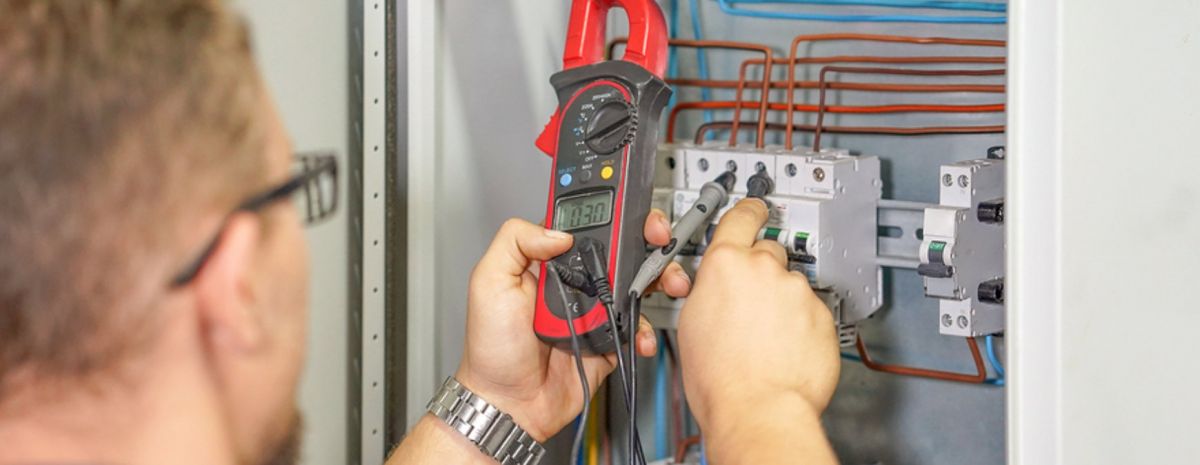TWS is a Great Training Option for Everyone
Learn more about how we can prepare you to advance your career.
Your lights. Your computer. Your coffee maker. Electricity powers them all and much, much more, and electricians are the people behind the scenes making it all possible.1 That’s why they’re still clocking in everyday even during the COVID-19 pandemic. They’re essential workers.2
Keep reading to see how electricians help power America during national emergencies and in more normal times.
Essential Workers Definition
What is an essential worker? The definition of an essential worker is “an employee that performs work involving the safety of human life or the protection of property.” It comes from the Essential Services Act of 2013. This legislation is designed to help government agencies decide which workers cannot be laid off when reducing their spending.3
Fast forward to 2020: a global health crisis grips the country and federal and state governments must decide which workers should stay home to contain the spread of the COVID-19 virus.2,4
Have You Considered a Career in the Skilled Trades?
Fill out the form to recieve a no obligation info packet.
Most Americans depend on electricity daily. It’s essential.2
When there’s a problem with the electrical connections in a home’s network of lighting, who fixes it? Typically, electricians do. When a building’s communications system fails, who repairs it? Electricians usually do. Wherever the power goes out, it’s usually electricians who come to the rescue.1
That’s why electricians made both federal and state governments’ lists of essential workers.2,4
Electricians on Federal and State Essential Worker Lists
Federal Essential Worker List
The Cybersecurity and Infrastructure Security Agency’s (CISA) list of essential workers includes electricians. CISA, a branch of the U.S. Department of Homeland Security, published the “Advisory Memorandum on Identification of Essential Critical Infrastructure Workers during COVID-19 Response.” The agency deemed electricians essential to the continued operation of commercial facilities and public works and infrastructure support services.2
Commercial Facilities
Electricians are necessary for providing services that ensure the continued security, safety and essential activities of occupants of commercial buildings.2

New: Industrial Maintenance
Learn About Our New Advanced Industrial Maintenance Program in Houston
Tulsa Welding School is proud to announce our newest program offering available at our Houston Campus – Advanced Industrial Maintenance Technology! Learn the skills you need to take on the industries of manufacturing, distribution, energy production and facility maintenance in as few as 7 months.
Public Works and Infrastructure Support Services
Electricians, along with other skilled trades workers, are needed to maintain the sanitation, safety and essential operation of businesses, residences and buildings, including senior living facilities and hospitals.2
State Essential Worker List
Many states also consider electricians essential during the COVID-19 pandemic, including them on their state-issued essential worker lists. This was the case in Alabama, Arizona, Washington DC, Georgia, Hawaii, Maine, Minnesota, Mississippi, South Carolina and California.4,5
For example, California listed electricians as essential to supporting the security, safety and critical operations in commercial and residential buildings, as well as construction sites. These included hospitals and senior living facilities, as well as construction projects ensuring the availability of energy, transportation, communications and more.5
Electrician Training and the Path to an Essential Career in Wiring

How could you prepare for an essential career in electrical wiring?
Some of these tradespeople start with an electrician training program at a trade school. Such programs may provide instruction in basic electricity, circuitry and safety practices.6
For example, the Electrical Applications program offered at Tulsa Welding School’s Jacksonville, Florida, campus includes the following coursework:
- Fundamentals of electricity
- Commercial and residential electrical wiring
- Motors and lighting practices
- Advanced commercial wiring
- Electrical distribution systems
- Fundamentals of solar
The 7-month program can prepare students for careers as a residential electrician, commercial electrician, maintenance electrician, industrial electrician or solar panel installer.
The electrician career path may require additional training and licenses, depending on where you work.6
Electricians: Essential Workers Today. Essential Workers Tomorrow
Many electricians are playing a critical role in helping to ensure the nation has power during the COVID-19 crisis. For safety. For security. For critical operations.2
But what happens after the pandemic? Will the lights simply flicker out? Will cell phones and computers die? Will hospitals, nursing homes and government buildings shut down?1,2
It’s highly unlikely. The country will probably count on electricians for many years to come, both for traditional wiring jobs and for projects in the growing green economy.7,8
In fact, the Bureau of Labor Statistics predicted faster than average job growth for electricians back in 2018: jobs for these professionals should be added at a rate of 10% through 2028.8
Are you thinking a career in wiring could be a good fit for you? Chat with the admissions team at Tulsa Welding School today. Call 1 (855) 237-7711.
1https://www.bls.gov/ooh/construction-and-extraction/electricians.htm#tab-2
2https://www.cisa.gov/sites/default/files/publications/Version_3.0_CISA_Guidance_on_Essential_Critical_Infrastructure_Workers_4.pdf
3https://www.congress.gov/bill/113th-congress/senate-bill/724/text?mod=article_inline
4https://www.jlconline.com/coronavirus-construction-limits-state-by-state-tracker
5https://covid19.ca.gov/img/EssentialCriticalInfrastructureWorkers.pdf
6https://www.bls.gov/ooh/construction-and-extraction/electricians.htm#tab-4
7https://www.onetonline.org/help/green/47-2111.00
8https://www.bls.gov/ooh/construction-and-extraction/electricians.htm#tab-1
This blog has been labeled as archived as it may no longer contain the most up-to-date data. For a list of all current blog posts, please visit our blog homepage at https://www.tws.edu/blog/







